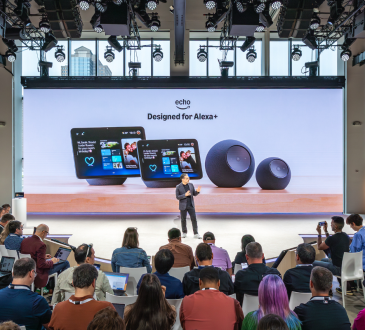BrandView: Yext Scout Guides Brands Through AI Search Challenges

There’s one clear constant in the ever-evolving world of AI: change can be faster and more complex than most brands can process when it comes to search. From large language models that can summarize the entire web to voice assistants capable of answering complex questions in a natural tone, how people search for and find information is changing by the day.
Yext, a business that has been helping companies manage their online presence for many years, is now taking a step to bring its own focus on search into the age of AI with the launch of a new service called Yext Answers.
A New Era of Search
Businesses have been optimizing their sites and listings for traditional keyword search engines for over a decade. But in the age of generative AI, that model no longer captures all the dynamics at play.
Instead of sitting down and typing a string of search keywords, users are increasingly asking casual, conversational questions and expecting immediate, detailed answers.
In other words, brand visibility no longer relies solely on search engine optimization (SEO); it increasingly depends on how artificial intelligence systems interpret and display a brand’s data.
“The move from basic keyword searches to natural-language questions is rewriting the playbook,” a Yext spokesperson said in a press briefing last month. “Businesses that don’t continue to adapt risk falling completely out of the new search results.”
Yext Scout is the company’s response to that obstacle—a hybrid of consultancy, analytics suite, and strategy toolkit that identifies how data might be misread by AI systems and what to do about it.
What Yext Scout Offers
Yext Scout is essentially an intelligent platform. It continuously scans how a brand’s information appears on AI-driven search engines, chatbots, and voice assistants.
Rather than simply tallying up website traffic or typical search rankings, Scout measures AI visibility—the frequency with which large language models surface a company’s information in conversational answers and how accurately they do so.
Key features include:
- AI Search Audits – Scout combs major generative AI platforms to confirm if a brand’s information (like location data, product descriptions, and FAQs) is being read properly and reflects the most recent information.
- Competitor Benchmarking – Businesses can see where their AI search presence stands against industry competition and pinpoint gaps or opportunities.
- Insight for Action – Going beyond raw data, the platform recommends steps to enhance AI visibility, such as structured data improvements or content designed for natural-language queries.
By focusing on these areas, Yext aims to give marketing teams a clear path forward as AI fundamentally transforms search.
The Challenges Brands Face
Generative AI has surprised many within the business world. While traditional SEO remains a crucial part of search rankings, it is no longer an assurance that a chatbot will deliver a company’s answer.
AI systems are often designed to produce an answer based on a mix of sources, some more reliable than others. That creates several risks:
- Inaccurate Data – If a model draws from outdated or false information, consumers may get incorrect details about a company’s hours, prices, or policies.
- Brand Dilution – As AI synthesizes from multiple sources, a company can lose its unique voice or differentiators.
- Difficult Measurement – It’s harder to measure how frequently a brand name appears in AI-generated responses compared to text-based search results.
“Businesses used to be able to know that if they optimized for some keywords, they’d appear on page one,” said an independent digital marketing analyst. “Now, the ‘page one’ might be a spoken sentence in a voice assistant, and you either make it into that answer or you don’t. That’s a huge shift.”
Yext’s Broader Strategy
Search innovation is nothing new to Yext. The company built its reputation on helping brands keep accurate information across search sites, maps, and directories. Over time, it expanded into site search and analytics.
This trajectory has led to Yext Scout, positioning the company as an indispensable partner for businesses moving into the next age of search.
The Scout rollout highlights Yext’s conviction that data quality and structure are more important than ever. AI systems depend heavily on structured, authoritative data to provide reliable results.
By helping businesses supply clean, well-structured information, Yext increases the chances that AI platforms will choose that data when creating answers.
Real-World Applications
Yext Scout’s early adopters come from a variety of industries, including retail and healthcare.
- Restaurant Chain Example: A national restaurant chain used Scout to audit how its menu and hours appeared in AI searches. The platform discovered that several generative AI tools were using outdated third-party listings. After updating its structured data and adding clear product descriptions, the chain saw a measurable improvement in how often its official details surfaced in AI assistants’ answers.
- Healthcare Provider Example: A healthcare provider used Scout to ensure that clinic locations and insurance acceptance information were accurate in voice-assistant responses. For patients making time-sensitive decisions, that accuracy proved critical.
Educating the Market
Yext Scout also aims to educate. Many marketing teams are still defining what “AI search” actually is and how it differs from traditional SEO.
To fill that gap, Yext provides webinars, white papers, and strategy sessions alongside the platform. These resources help brands understand not only the “how,” but also the “why” of AI-centric optimization.
Analysts see this educational component as essential.
“The technology is not new, but there’s a new urgency,” said one digital strategy consultant. “Equipping companies with tools and guidance helps give them confidence to act quickly.”
Looking Ahead
The AI-search landscape continues to evolve. Large language models are changing rapidly, and new players enter the market every month.
Yext recognizes that Scout will have to evolve as these technologies advance. The company plans to continuously update its systems to reflect new platforms and algorithm changes so that clients remain ahead of the curve.
For brands, the takeaway is clear: AI isn’t a distant trend but a present reality that shapes how consumers find and engage with businesses. Preparing for that reality requires more than typical SEO tactics—it demands proactive management of data and visibility.
Conclusion
More than a new product, Yext Scout is an important move for businesses determined to stay visible in the world of AI-first search. With comprehensive audits, actionable insights, and continuous education, it supports brands in understanding the complex new territory of generative search.
As voice assistants, chatbots, and AI-powered engines continue to change the way we find information, Yext’s initiative underscores a simple truth: in the age of intelligent search, good data is the single most important marketing asset any business can own.




